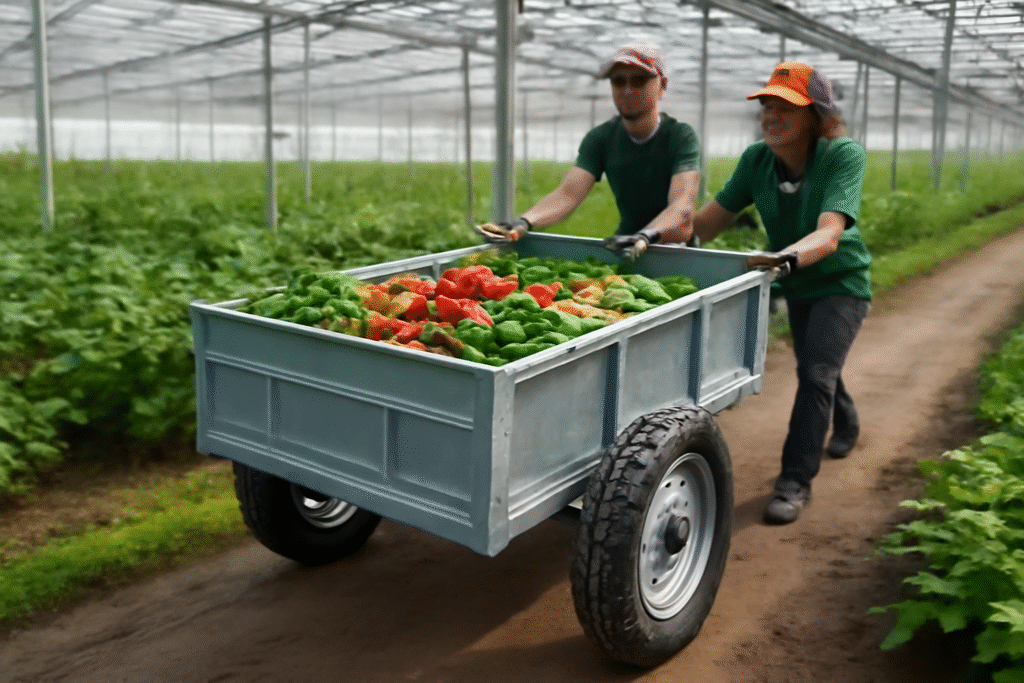In industries where efficiency and smooth logistics matter most, Afruimwagens play a vital role. Known in Dutch-speaking regions as multi-purpose trolleys or transport carts, Afruimwagens are used in agriculture, warehouses, construction, and healthcare. They are designed to reduce manual labor, streamline processes, and provide safer handling of heavy or bulky materials.
Afruimwagens are not just simple carts. They are engineered with durable frames, ergonomic designs, and specialized features to adapt to different industries. From transporting freshly harvested crops in farms to moving medical supplies in hospitals, these versatile tools have become indispensable.
History of Afruimwagens
The concept of Afruimwagens dates back to early agriculture, when farmers relied on wooden carts to carry harvests. Over the decades, technological advancements transformed them into modern, durable equipment.
By the mid-20th century, steel and aluminum versions became popular in Europe. As industries grew, Afruimwagens found applications beyond farming—into logistics, construction, and healthcare. Today, they represent efficiency, safety, and sustainability in modern transport solutions.
Types of Afruimwagens
Afruimwagens come in different types, each designed for specific uses:
-
Manual Afruimwagens: Simple push or pull carts suitable for farms and small warehouses.
-
Industrial Afruimwagens: Heavy-duty versions capable of handling bulk loads in factories and construction.
-
Specialized Afruimwagens: Designed for medical, greenhouse, or hospitality industries with unique features like stainless steel frames or easy-to-clean surfaces.
Materials Used in Afruimwagens
The durability of Afruimwagens depends on the material used:
-
Steel: Strong, durable, but heavy. Ideal for industrial use.
-
Aluminum: Lightweight, resistant to rust, suitable for agriculture.
-
Plastic: Cost-effective and light, often used in medical environments.
-
Wood: Traditional, still used in farms for lighter loads.
Design Features of Afruimwagens
Modern Afruimwagens include:
-
Wheels: Large rubber wheels for rough terrain, or swivel wheels for smooth indoor surfaces.
-
Handles: Ergonomic grips reduce strain on workers.
-
Storage capacity: Some models include multi-tier shelving or compartments for efficient sorting.
How Afruimwagens Work
Afruimwagens use mechanical leverage to reduce effort in moving heavy loads. Their balanced design ensures that weight is evenly distributed, making them easy to maneuver. The adaptability of Afruimwagens allows them to be used in multiple sectors.
Applications of Afruimwagens in Agriculture
Afruimwagens remain crucial in farms and greenhouses:
-
Transporting harvested crops
-
Moving fertilizers and tools
-
Organizing greenhouse logistics
They help reduce post-harvest losses and improve efficiency in agricultural operations.
Afruimwagens in Warehouses
In warehouses, Afruimwagens are widely used for:
-
Picking and stacking orders
-
Moving goods between aisles
-
Supporting safety by minimizing heavy lifting
They complement forklifts and pallet jacks for mid-sized tasks.
Afruimwagens in Construction Sites
Construction workers use Afruimwagens to:
-
Move tools and building materials
-
Transport smaller loads across rough terrain
-
Improve efficiency without over-relying on heavy machines
Medical and Healthcare Uses
Hospitals use Afruimwagens for:
-
Transporting medical supplies
-
Moving waste materials
-
Supporting nurses with lightweight equipment transport
Plastic and stainless steel models are especially popular for their hygiene.
Benefits of Using Afruimwagens
Key benefits include:
-
Efficiency: Faster transport of materials
-
Cost savings: Reduces manpower needs
-
Safety: Minimizes worker injuries from heavy lifting
-
Versatility: Adaptable across industries
Challenges with Afruimwagens
Despite their usefulness, Afruimwagens face challenges:
-
Wheel jams on rough terrain
-
Durability issues with heavy loads
-
Regular maintenance required for longevity
How to Choose the Right Afruimwagens
Factors to consider include:
-
Load capacity
-
Material durability
-
Industry-specific requirements
-
Price and warranty
Top Brands Producing Afruimwagens
Leading brands in Europe and beyond include:
-
Dutch and German manufacturers specializing in agriculture tools
-
Custom-built Afruimwagens suppliers
-
Online retailers offering both budget and premium versions
Maintenance Tips for Afruimwagens
To extend life:
-
Clean regularly
-
Lubricate wheels
-
Store indoors to prevent rust
Common Problems and Solutions
-
Wheel Jamming → Lubricate or replace wheels
-
Handle Breakage → Reinforce with steel frames
-
Rust → Use anti-rust coatings or stainless steel
Safety Measures with Afruimwagens
Workers should:
-
Avoid overloading
-
Push instead of pull
-
Inspect regularly for wear and tear
Cost of Afruimwagens
Prices vary:
-
Basic manual models: €50–€150
-
Industrial versions: €200–€600
-
Specialized hospital carts: €300+
Sustainability and Eco-Friendly Designs
With growing awareness of sustainability, Afruimwagens now use recyclable metals, eco-friendly coatings, and energy-efficient designs.
Innovations in Afruimwagens
The future brings:
-
Smart carts with sensors
-
Automated Afruimwagens for warehouses
-
AI-powered logistics integration
Comparing Afruimwagens with Alternatives
While forklifts and pallet jacks handle large loads, Afruimwagens excel in flexibility and cost-effectiveness for smaller-scale transport.
Case Studies of Afruimwagens in Use
-
Agriculture: Dutch farms using aluminum Afruimwagens for efficient harvesting.
-
Warehouses: Retail companies streamlining logistics.
-
Hospitals: Medical staff using stainless steel carts for hygiene.
Future of Afruimwagens
With trends in automation and smart logistics, Afruimwagens will evolve into more high-tech tools, integrating IoT and AI for efficiency.
Afruimwagens Buying Guide
-
Where to buy: Online retailers, agricultural suppliers, industrial stores
-
Customization: Many companies offer tailor-made Afruimwagens for specific industriesAlso read ;
Also read: Email Address Often NYT Crossword Clue
FAQs
What are Afruimwagens used for?
They are transport carts used in agriculture, warehouses, construction, and healthcare.
Which material is best for Afruimwagens?
Steel is durable, aluminum is lightweight, and plastic is hygienic for medical use.
Are Afruimwagens expensive?
Basic versions are affordable, while industrial and specialized versions cost more.
Can Afruimwagens be customized?
Yes, manufacturers often build custom designs based on industry needs.
What’s the lifespan of Afruimwagens?
With proper care, they can last 10+ years.
Are Afruimwagens eco-friendly?
Modern versions use recyclable and sustainable materials.
Conclusion
Afruimwagens are far more than simple carts—they are essential tools in agriculture, warehouses, construction, and healthcare. With evolving designs, eco-friendly options, and smart features, Afruimwagens will continue to play a major role in efficient logistics and sustainable industry practices.
From small farms to large hospitals, Afruimwagens provide the perfect balance of durability, safety, and cost-effectiveness.



